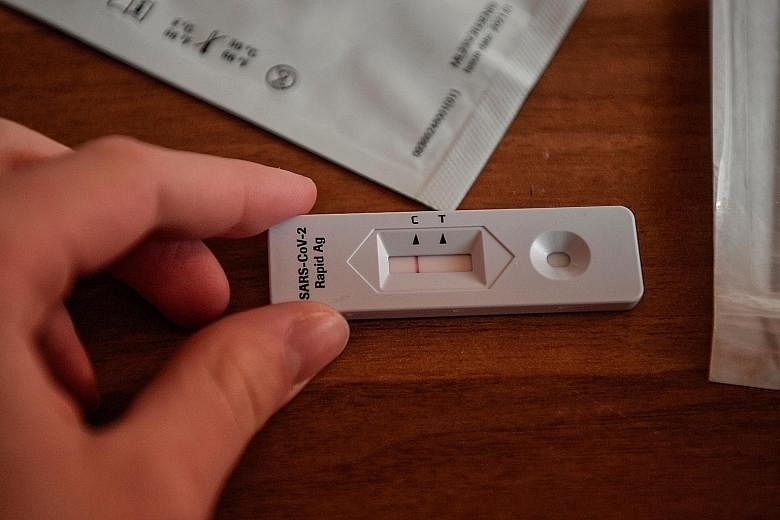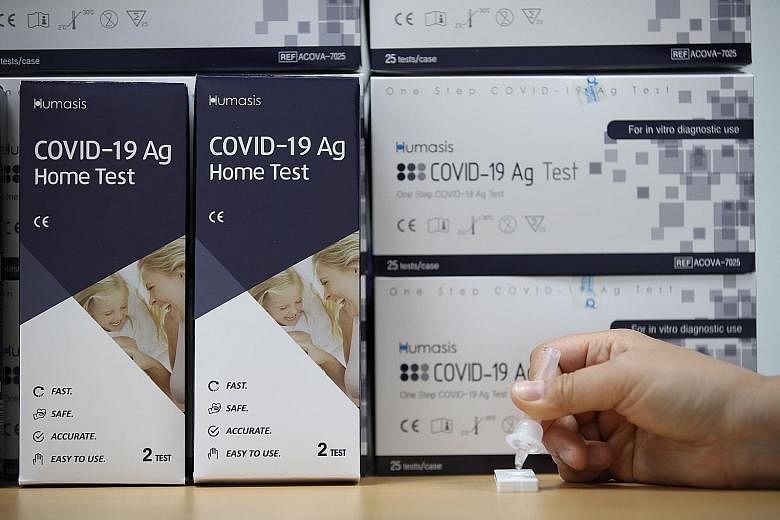Do-it-yourself (DIY) Covid-19 test kits will be a useful tool in Singapore's arsenal to fight the coronavirus as they are quick and convenient to use, said experts yesterday.
But the experts also flagged potential areas of concern, such as the under-declaring of results, with one suggesting that the authorities regulate such kits and integrate them into government health systems.
DIY tests, which are already in use in places such as South Korea, the United States and Europe, will be available at pharmacies in Singapore soon, said Prime Minister Lee Hsien Loong on Monday. He added that they will be simple to use and not as uncomfortable as the polymerase chain reaction (PCR) test.
DIY tests work like the antigen rapid tests (ARTs) that are heavily used in pre-event testing. ARTs - and most DIY tests currently available overseas - return results in about 30 minutes, but are less accurate than PCR tests, which usually take a day or two to process.
The Ministry of Health told The Straits Times that it is currently in discussion with relevant agencies and partners to bring in over-the-counter ART kits, and will provide more information when ready.
Infectious diseases expert Paul Tambyah, president of the Asia-Pacific Society of Clinical Microbiology and Infection, said the DIY kits are useful because they can be used at home or if there is a need to travel somewhere in an emergency and a regular PCR test or ART cannot be done.
"These are essentially stripped-down ARTs... Many US airlines accept home test results. Companies can also get their employees to do them on a regular basis until vaccinations are completed," he said.
Dr Leong Hoe Nam, an infectious diseases specialist from Rophi Clinic, said that a DIY test will be simple to administer - almost like a pregnancy test kit.
"It is much cheaper, at a cost price of $15 to $20 per day. It takes away the complexity of testing, giving the power to the consumers," he said.
In comparison, a PCR test costs roughly between $150 and $200, while an ART costs as little as $10.
The convenience that DIY kits offer makes them good for businesses that want to reassure their customers, and workers at high risk of exposure to the virus who wish to give their families peace of mind, said Dr Ling Li Min, an infectious diseases physician from Rophi Clinic.
-
Home kits used in some other countries
-
Cheaper, quicker and less invasive home kits for Covid-19 testing have already been approved for sale in a number of countries. They are not as accurate as the polymerase chain reaction (PCR) test. Taking a DIY test though is only the first step and any positive result needs to be confirmed with the gold-standard PCR test administered by healthcare professionals in a medical setting. Here's a look at the two main types of tests available over the counter and where they are currently available.
ANTIGEN RAPID TEST (ART)
What it tests for: Proteins made by the virus, and not the virus itself. This detects how active, and therefore infectious, the virus is. Those infected with Covid-19, even the asymptomatic ones, will be most at risk of passing the virus to others in the first week after infection, which is also when the test works best.
How to use: A swab (akin to a cotton bud) is used to retrieve a sample from the nostrils or throat. Some tests allow saliva to be used instead. For greater accuracy, Britain's National Health Service recommends one nose swab and one throat swab for each test.
The swab is then applied on a specially treated strip or tube. Results appear in 15 to 20 minutes.
How reliable: The journal Science reported that most antigen tests have a sensitivity between 50 per cent and 90 per cent.
Where available (cost): United States (from US$25/S$33), Britain (free from the National Health Service), Germany (€25/S$40.30), China (80 yuan/S$16.60), India (250 rupees/S$4.50).
PCR TEST
What it tests for: Traces of the genetic material of the coronavirus on samples. Requiring specific equipment and chemical reagents, it is useful for confirming an infection, but its high sensitivity means that it can also detect dead or deactivated virus remnants still present in someone who has recovered from Covid-19.
How to use: Users put a nasal or throat swab into a tube containing chemical reagents before sealing it. Some tests allow saliva samples.
Typically, these tests are mail-in kits, meaning that the tube will be sent as priority mail to a laboratory, and results are available within a day.
The Lucira test from the US allows users to plug their vial into a portable device that produces a result within 30 minutes.
How reliable: More than 90 per cent accurate at detecting the virus and avoiding false negatives.
Where available (cost): US (from US$55/S$73), Britain (free from the National Health Service), Japan (4,500 yen/S$54.30).
But the kits involve several risks, including the possibility that they could produce false results if administered incorrectly.
Dr Ling highlighted the risk of false negatives. "This means infected people may think they are virus-free, especially if they have yet to have symptoms," she said, adding that they could then spread the disease unknowingly.
The experts agreed that the results of such tests have to be carefully interpreted.
Professor Tambyah said they could also show a false positive, so a confirmatory PCR test - the gold standard in Covid-19 testing - is needed to confirm a diagnosis.
The experts noted that not declaring a positive DIY test result could be dangerous, given how it would mean that infectious people could be spreading the disease.
Prof Tambyah suggested regulating the sale of such kits in pharmacies and integrating them into Singapore's national gateway to citizens' medical records, prescriptions and clinic appointments.
"The loop could be closed between purchase of a kit and reporting of the results before the kit expires," he said.
In India, users of the CoviSelf DIY test kit have to download an app to use the kit. The app is synced with the test results, which are directly fed into a report on the Indian Council of Medical Research's portal.
On the point that some might not report a positive test result for fear of discrimination or because of a reluctance to be admitted to hospital, Dr Leong said the stigma surrounding Covid-19 should be addressed to encourage people to seek medical help if needed.
He and Prof Tambyah drew parallels with how some patients with the human immunodeficiency virus might hide the status of their health.
"There is a need to clear the stigma. Being positive for Covid-19 does not mean anything, but some people might face the stigma," said Dr Leong.
The test does not replace seeking medical attention if one is ill, said the experts, who stressed that anyone who is ill or is displaying symptoms of Covid-19 should see a doctor.



